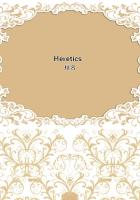The man was saturated with the atmosphere of the hot battle he lived in.From his childhood he had known nothing but the fever heat of his "little old New York," as he called it with affectionate slanginess, and any temperature lower than that he was accustomed to would have struck him as being below normal.Penzance was impressed by his feeling of affection for the amazing city of his birth.He admired, he adored it, he boasted joyously of its perfervid charm.
"Something doing," he said."That's what my sort of a fellow likes--something doing.You feel it right there when you walk along the streets.Little old New York for mine.It's good enough for Little Willie.And it never stops.Why, Broadway at night----"He forgot his chop, and leaned forward on the table to pour forth his description.The manservant, standing behind Mount Dunstan's chair, forgot himself also, thought he was a trained domestic whose duty it was to present dishes to the attention without any apparent mental processes.Certainly it was not his business to listen, and gaze fascinated.This he did, however, actually for the time unconscious of his breach of manners.The very crudity of the language used, the oddly sounding, sometimes not easily translatable slang phrases, used as if they were a necessary part of any conversation--the blunt, uneducated bareness of figure--seemed to Penzance to make more roughly vivid the picture dashed off.
The broad thoroughfare almost as thronged by night as by day.Crowds going to theatres, loaded electric cars, whizzing and clanging bells, the elevated railroad rushing and roaring past within hearing, theatre fronts flaming with electric light, announcements of names of theatrical stars and the plays they appeared in, electric light advertisements of brands of cigars, whiskies, breakfast foods, all blazing high in the night air in such number and with such strength of brilliancy that the whole thoroughfare was as bright with light as a ballroom or a theatre.The vicar felt himself standing in the midst of it all, blinded by the glare.
"Sit down on the sidewalk and read your newspaper, a book, a magazine--any old thing you like," with an exultant laugh.
The names of the dramatic stars blazing over entrances to the theatres were often English names, their plays English plays, their companies made up of English men and women.
G.Selden was as familiar with them and commented upon their gifts as easily as if he had drawn his drama from the Strand instead of from Broadway.The novels piled up in the stations of what he called "the L" (which revealed itself as being a New-York-haste abbreviation of Elevated railroad), were in large proportion English novels, and he had his ingenuous estimate of English novelists, as well as of all else.
"Ruddy, now," he said; "I like him.He's all right, even though we haven't quite caught onto India yet."The dazzle and brilliancy of Broadway so surrounded Penzance that he found it necessary to withdraw himself and return to his immediate surroundings, that he might recover from his sense of interested bewilderment.His eyes fell upon the stern lineaments of a Mount Dunstan in a costume of the time of Henry VIII.He was a burly gentleman, whose ruff-shortened thick neck and haughty fixedness of stare from the background of his portrait were such as seemed to eliminate him from the scheme of things, the clanging of electric cars, and the prevailing roar of the L.
Confronted by his gaze, electric light advertisements of whiskies, cigars, and corsets seemed impossible.
"He's all right," continued G.Selden."I'm ready to separate myself from one fifty any time I see a new book of his.He's got the goods with him."The richness of colloquialism moved the vicar of Mount Dunstan to deep enjoyment.
"Would you mind--I trust you won't," he apologised courteously, "telling me exactly the significance of those two last sentences.In think I see their meaning, but----"G.Selden looked good-naturedly apologetic himself.
"Well, it's slang--you see," he explained."I guess I can't help it.You--" flushing a trifle, but without any touch of resentment in the boyish colour, "you know what sort of a chap I am.I'm not passing myself off as anything but an ordinary business hustler, am I--just under salesman to a typewriter concern? I shouldn't like to think I'd got in here on any bluff.I guess I sling in slang every half dozen words----.""My dear boy," Penzance was absolutely moved and he spoke with warmth quite paternal, "Lord Mount Dunstan and I are genuinely interested--genuinely.He, because he knows New York a little, and I because I don't.I am an elderly man, and have spent my life buried in my books in drowsy villages.Pray go on.Your American slang has frequently a delightful meaning--a fantastic hilarity, or common sense, or philosophy, hidden in its origin.In that it generally differs from English slang, which--I regret to say--is usually founded on some silly catch word.Pray go on.When you see a new book by Mr.Kipling, you are ready to `separate yourself from one fifty' because he `has the goods with him.' "G.Selden suppressed an involuntary young laugh.
"One dollar and fifty cents is usually the price of a book,"he said."You separate yourself from it when you take it out of your clothes--I mean out of your pocket--and pay it over the counter.""There's a careless humour in it," said Mount Dunstan grimly."The suggestion of parting is not half bad.On the whole, it is subtle.""A great deal of it is subtle," said Penzance, "though it all professes to be obvious.The other sentence has a commercial sound.""When a man goes about selling for a concern," said the junior assistant of Jones, "he can prove what he says, if he has the goods with him.I guess it came from that.














